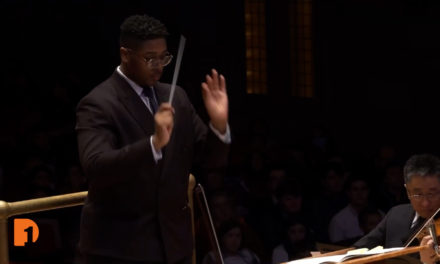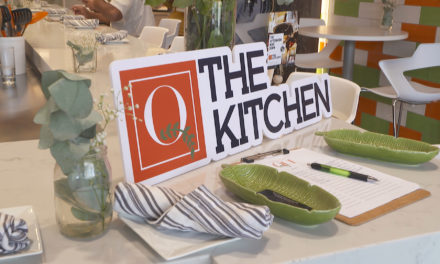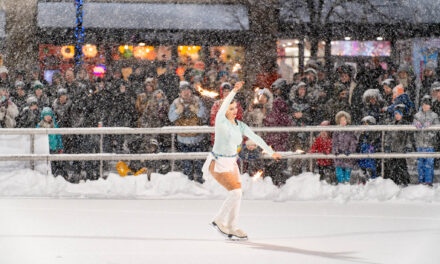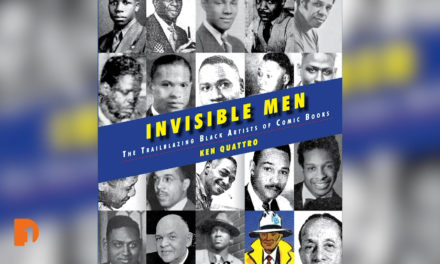A friendship sparked 30 years ago at a local radio station has paved the way for the founding of Common Chords, a Detroit-based nonprofit focusing on understanding diverse groups of people and creating connections between shared values using music. When Rev. Robert Jones Sr., who grew up in Detroit, and Matt Watroba, a former teacher from Plymouth, connected 30 years ago, they found something special when they began creating music.
Audiences reacted positively to their camaraderie on stage, which led the two to create Common Chords. One Detroit producer Sarah Smith met up with Jones Sr. and Watroba at the reverend’s church, Sweet Kingdom Baptist in Detroit, to hear more about Common Chord’s mission and vision for the organization’s future.
Full Transcript:
[Duo singing]: This little light of mine, I’m gone let it shine…
Reverend Robert Jones Sr., Co-Creator, Common Chords: Maybe the main underlying message of Common Chords is that we want to tear down the things that separate us.
[Duo singing]: I’m gone let it shine, let it shine, let it shine, let it shine.
Reverend Robert Jones Sr.: We’re more separate than ever coming out of George Floyd, coming out of the election, coming out of the pandemic. And so there’s so little communication that we often talk about, okay, what is the one thing that we say that people don’t have pushback? Among those things is art, music and stories. Through your music and your art, I can experience your humanity.
Speaker 1: Oh, tell me what I say. Tell me what I say? Tell me what I say. Tell me what I say. Tell me what I say now. Tell me what I say. Tell me what I say, oh, I think we should do that again.
Matt Watroba, Co-Creator, Common Chords: Common Chords did not spring out of nothing, it sprang out of 30 years of traveling around the country with my best friend, reminding people that there are more things to celebrate than there are to fight about.
Reverend Robert Jones Sr.: So we have this friendship. And, you know, it’s just our friendship. But then we start to see that there are people who can’t get past their differences, who cannot communicate unless they are carbon copies of each other. And I think we started to realize that the same love of shared values that made us friends were applicable to other situations in society.
Matt Watroba: One of the things we started to notice about the work we did as a duo was the stories we told, and the educational aspects of the stuff we did. Turned out to be the thing that actually makes us unique.
Reverend Robert Jones Sr.: We’re bluegrass. You had a guitar player by the name of Lester Flatt and Lester used to play something called the G Run. Mr. Watroba would you demonstrate the G Run?
Matt Watroba: Every bluegrass guitar player at the end of the phrase would go,
Reverend Robert Jones Sr.: Oh, that’s pretty. Would you do that again?
Matt Watroba: So basically, when we decided to actually formalize it into like, a nonprofit organization, the idea was to take what we’ve already done over three decades and put it into words and make an organization around it.
Reverend Robert Jones Sr.: So part of the idea of art is in storytelling and songwriting is that I can put my story into that song. You experience the song, you learn more about me, I learned more about you and then we can have a conversation.
Reverend Robert Jones Sr.: So this song is for my great grandfather. His name was Will Cunningham. Connected county, Alabama, 1925, Will Cunningham rode into town to get his week supplies. Now, Will was a black man who fought in World War One. And he’d face the smoke and powder, but he never chose to run.
Matt Watroba: You know, when it comes to choosing songs for the performance, sometimes we don’t even do full songs, we’ll just do snippets of songs that are examples. We use the metaphor of a tree, so we’ll say, imagine this big tree out in the middle of the forest and on this tree are all these different branches and each branch is a different kind of American music. New branches off that tree seemed to pop off every time people from diverse places share their music with each other.
Reverend Robert Jones Sr.: So we get a guy by the name of Sun House, who’s down in COMAH County, Mississippi, and he’s doing a song called Death Letter Blues. And it’s like. I got a letter this morning, how do you bring you read, said hurry cause the girl you love is dead. Got a letter this morning, Oh lord, are you ringing red?
Reverend Robert Jones Sr.: Rap is old. Rap goes back to slavery time. Then it came up through gospel. People literally rapping, and then jazz is called scatting. So Matt and I can show you that this stuff has a 200-year-old plus foundation that’s based in the idea of using the rhythmic word. And that’s just one genre that you can do that with.
Reverend Robert Jones Sr.: Music playing…
Matt Watroba: And for me, that message boils down to this idea that if it wasn’t for the sharing of different cultures in our country, we wouldn’t have the music we have. And I think we honed that down into a presentation that has the ability to really have people leave a little different than they were when they got there.
Reverend Robert Jones Sr.: Hopefully when you leave, you start to think about how many things that I thought were set in stone are now fluid.
Matt Watroba: One of the things I got really excited about is this idea of not just saying, we hope that this fosters conversation, but will facilitate the conversation. And what is it that drives fear? It’s the unknown. You know, it’s if it wasn’t for us meeting, we would have never probably had the courage to do it under any other circumstance. So I think one thing we can all do in honor of Dr. Martin Luther King is to step out of that comfort zone.
Reverend Robert Jones Sr.: One of the ideas is to get to the point to teach perhaps like-minded younger artists that the music is a tool for change. And that sort of coming off of that seed, we end up growing a garden that everybody can enjoy.
Matt Watroba: Could you love me? If I don’t look like you. Is it deeper? Is it stronger? Something hidden, something true.
Reverend Robert Jones Sr.: Use the music for healing. Use the music for social change. Use the music to tell a great story, to create bridges between communities.
Matt Watroba: Everything Common Chords does will always have that idea is how can we bring diverse people together to get to know each other, to hear each other’s stories, to sing each other’s songs?
Reverend Robert Jones Sr.: Common Chords doesn’t solve all of those problems, but hopefully it causes us to question our answers to the point where maybe that little germ of a song or that story or that concert causes us to rethink some other things and reorder some things in our world.
Subscribe to One Detroit’s YouTube Channel & Don’t miss One Detroit Mondays and Thursdays at 7:30 p.m. on Detroit Public TV, WTVS-Channel 56.
Catch the daily conversations on our website, Facebook, Twitter @DPTVOneDetroit, and Instagram @One.Detroit
View Past Episodes >
Watch One Detroit every Monday and Thursday at 7:30 p.m. ET on Detroit Public TV on Detroit Public TV, WTVS-Channel 56.




